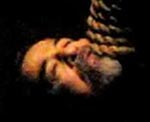|
|
|
Race riot put down at California state prison
Law Center |
2007/01/02 08:54
|
| The California state correctional facility in Chino was under lockdown Sunday after prison authorities put down a major race riot that broke out Saturday morning reportedly setting blacks and Hispanic inmates against each other in one of the worst instances of prison rioting in the state in years. A California Corrections Department spokesperson said that guards had to use everything from tear gas to foam projectiles to quell the disturbance, a process which took hours. Over 50 people were treated for injuries. The spokesman said some 36 inmates with what he described as "unacceptable housing situations" were being considered for transfer. |
|
|
|
|
|
|
Apple stock options probe reports no misconduct
Corporate Governance |
2007/01/02 03:53
|
| Apple Computer, Inc. Friday disclosed the findings of an internal report into alleged stock option manipulation by senior managers, including CEO Steve Jobs, purporting to clear its executives of any wrong-doing and concluding that Jobs did not "financially benefit" from stock options, despite knowledge of favorable grant dates. Apple was facing a US Securities and Exchange Commission (SEC) probe in connection with various alleged securities violations, including a failure to properly disclose option backdating. After concluding the internal investigation, Apple restated its yearly financial statements with the SEC, completing a three-month probe. |
|
|
|
|
|
|
Submit Your Press Release to Breaking Legal News!
Breaking Legal News |
2007/01/01 14:01
|
Submit your press release and skyrocket your exposure - Breaking Legal News prides itself on providing legal news directly from the source, YOU. We are accepting press releases and law firm news to be included in the appropriate section of Breaking Legal News. We are not only accepting current news, but we are also, for a limited time, accepting archived news dating back to January of 2007. By submitting your press release or firm/attorney news, you will have a reliable, respected, and external source for your clients and future clients to find news about you and your firm. This creates a more scalable feel for your firm and will also generously increase your exposure online. Breaking Legal News is #1 on most search engines for a variety of keywords including, “Legal News Website”, “Legal News Site”, “Breaking Legal News” and many more. We are also very strong with specific news topic searches, searching for almost any topic on our website will provide front page results on Google and others. Breaking Legal News is a very strong keyword oriented website, using cutting edge technology to archive and store past articles and press releases. This means that users are able to easily and quickly search and find any article that has ever been submitted to Breaking Legal News by keyword. If you have archived news, current news or press releases that you want people to find online then look no further. Breaking Legal News is one of the most powerful ways to get your news noticed. For more information, contact info@breakinglegalnews.com
|
|
|
|
|
|
|
New Year Means New Laws in Many States
Breaking Legal News |
2007/01/01 13:09
|
| For hundreds of thousands of minimum-wage workers around the country, the new year brings a raise. At the stroke of midnight on January 1, 2007, many new state laws will go into effect. The state minimum wage will increase in Arizona, California, Delaware, Massachusetts, New York , North Carolina, and Pennsylvania. Currently, the federal rate is set at $5.15. California and Massachusetts minimum-wage workers will see it go as high as $7.50 per hour. Illinois' $7.50-an-hour starting wage goes into effect in July. It also includes a 25-cent-per-hour increase in each of the following three years, raising the figure to $8.25 by 2010. In an environmental initiative, California will force coal-burning plants selling power in the state to install eco-friendlier technology. In Illinois, music groups that misrepresent themselves as the original artists will face fines of up to $50,000. The new law requires live acts to make it clear in their advertising that they are a salute or a tribute band, rather than the real thing. Dealing with imigration issues on its own, South Carolina will require nurses from other countries to have English-language proficiency to practice in the state. Illinois has delved into the area of eminent domain by requiring local governments to pay more and meet a higher legal threshold before seizing private property. North Carolina and Pennsylvania have set stricter campaign finance rules. Alaska and South Carolina have passed legislation aimed at preventing harassment in schools. Alaska will provide training to help school systems prevent bullying, while South Carolina will require school districts to adopt policies banning harrassment and intimidation. Wisconsin seeks to protect the rights of the wrongfully convicted by passing a law requiring law-enforcement agencies to record all interrogations of felony suspects, with either video or audio. Alabama and West Virginia cut taxes on its poorest wage earners, while North Carolina lowered taxes on those in its highest tax bracket. New York and Oklahoma eliminated the marriage penalty that imposed higher taxes on married couples than on single people. South Dakota and Texas raised taxes on cigarettes. Massachusetts' new health-care law hits a new milestone, allowing those earning up to 300 percent of the federal poverty level to buy into subsidized plans. (Those at or below the poverty level are already being signed up for virtually free health care.) |
|
|
|
|
|
|
Texas smokers hit with new excise tax
Tax |
2007/01/01 13:07
|
Texas smokers will pay considerably more for cigarettes beginning today as a new excise tax takes effect.
The state Legislature approved the measure in May in an effort to pressure smokers to quit and to allow a break on property taxes. The tax will increase $1 from a moderate 41 cents to $1.41 a pack, placing Texas among the 15 states with the highest cigarette levies. New Jersey has the highest tax, at $2.58 a pack. The increase will push the price of a single pack of cigarettes in Texas to about $4.50. The state comptroller's office has estimated the tax increase will generate $700 million a year, enabling a reduction in property taxes.
|
|
|
|
|
|
|
Rush to Hang Hussein Was Questioned
International |
2007/01/01 13:03
|
 Meanwhile the New York Times cited anonymous American officials as being "privately incensed" at how Saddam's hanging had been rushed forward in the dead of night early Saturday local time at the insistence of Iraqi Prime Minister Nouri al-Maliki and other top officials. The US officials indicated that they had been concerned with the legal process leading up to the execution, in particular the status of the constitutional requirement that a death warrant be approved by Iraq's president and vice-president, which created a problem as President Jalal Talabani, an opponent of the death penalty, refused to sign any warrant himself. A panel of Iraqi judges ultimately ruled that the constitutional provision was void in the context of the law governing the sentence handed down by the Iraqi High Tribunal, but the process was rushed. American officials also told the Times they had been concerned about the timing of the execution at the beginning of the Eid holiday.
The Times said that although the Americans had acknowledged that the execution of Saddam was an Iraqi matter, their reticence about the whole process was only heightened by the eventual video revelations of the confused and undignified manner in which it was finally conducted.
|
|
|
|
|
|
|
Legal age for buying tobacco to rise in Britain
International |
2007/01/01 01:57
|
Britain is raising the legal age to purchase tobacco from 16 to 18 years, the government announced Monday. The new age limit is aimed at helping retailers to spot underage smokers, and making it more difficult for young people to begin smoking, the government said. "Buying cigarettes has been too easy for under-16s, and this is partly due to retailers' selling tobacco to those under the legal age," public health minister Caroline Flint said. "The law change demonstrates our determination to stop this and to reduce the number of teenagers who smoke." The law will come into effect in October in England and Wales, the government said. The U.S., Canada, Ireland and New Zealand have similar laws. |
|
|
|
|
|
|
Class action or a representative action is a form of lawsuit in which a large group of people collectively bring a claim to court and/or in which a class of defendants is being sued. This form of collective lawsuit originated in the United States and is still predominantly a U.S. phenomenon, at least the U.S. variant of it. In the United States federal courts, class actions are governed by Federal Rules of Civil Procedure Rule. Since 1938, many states have adopted rules similar to the FRCP. However, some states like California have civil procedure systems which deviate significantly from the federal rules; the California Codes provide for four separate types of class actions. As a result, there are two separate treatises devoted solely to the complex topic of California class actions. Some states, such as Virginia, do not provide for any class actions, while others, such as New York, limit the types of claims that may be brought as class actions. They can construct your law firm a brand new website and help you redesign your existing law firm site to secure your place in the internet. |
Law Firm Directory
|
|






